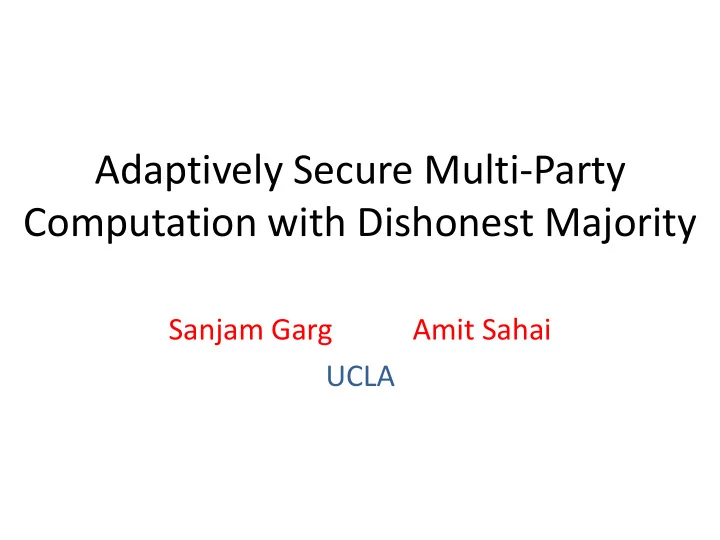

Adaptively Secure Multi-Party Computation with Dishonest Majority Sanjam Garg Amit Sahai UCLA
Secure Multiparty Computation • A set of mutually distrustful parties (n) wish to compute a joint function of their private inputs [Yao86, GMW87] • Adaptive Adversaries: Security desired in face of arbitrary malicious behavior by some of the participants that adversary chooses on the fly [CFGN96] • Very fundamental notion in cryptography
Multiparty Computation For every real there exists an adversary A adversary S Computational Indistinguishability: no probabilistic polynomial-time distinguisher can distinguish Trusted Party between the input/output distribution of the Protocol Execution honest parties and the adversary, in IDEAL and REAL world except with negligible probability. Ideal World Real World
Motivating Example: a secret sharing protocol [CFGN96] • Consider a setting with n parties and a dealer with a secret sk • Dealer secret shares sk among random n parties (and publishes the set of parties that get the shares) • Consider an adversary that can corrupt t = O(n) out of n parties • Non-Adaptive (or Static) adversary succeeds in obtaining secret with the negligible probability • While Adaptive adversary always succeeds
Previous Results • Adaptively secure MPC protocol in the standalone setting assuming honest majority. [CFGN96] • Doing better that honest majority – ZK and OT [Bea96a,Bea96b] – two-party computation [Bea98, KO04] – adaptively secure MPC protocol without honest majority but using a common random string [CLOS02]
Can we do adaptively secure MPC without honest majority and without assuming a trusted setup?
A very simple approach • We know – adaptively MPC when given access to an ideal commitment [e.g. CLOS02, CDMW09, GWZ09] – adaptively secure protocols for securely realizing the commitment functionality (e.g. [Bea98, PW09]) – Composition theorem of Canetti [Can00] • Surprisingly direct application of these results does not yield adaptive MPC. • This subtle issue was overlooked in the literature as it was thought as obvious. • Let’s see why!
Adaptively Secure Composition: More than Meets the Eye • 2-party adaptively secure protocol does not guarantee security in the setting of n-parties, even if only two of the parties are ever talking to each other (quiet parties also have secret state) • Consider an adaptive 2PC protocol with a black- box simulation • Relies on rewinding • In the n-party case adversary can also corrupt parties that do not communicate • This was never handled in the 2- party case…
Our Results • Round inefficiency is unavoidable when using constant round black-box simulation: if corruption of up to n-1 parties is – No o(n/log n) round protocol securely realizes a allowed (in non-erasure model) (natural) n-party functionality with a black-box Or if erasures are allowed simulator. Linear in depth of circuit otherwise – Positive feasibility result (however round inefficient) Even if erasures are allowed Does not old in the setting of • Round efficient protocol with non-black box (except erasure of inputs) Super-polynomial simulation simulation (however overall inefficient) – As good as semi-honest setting
Impossibility Result – Building the rewinding intuition Consider o(n/log n) round protocol between 2-parties x 3 ,x 4 , … x n. . . . x 1 x 2 … x 3 x 4 x 5 x 6 X n-1 x n
Real World Execution Checks that the value provided are consistent with x 3 ,x 4 , … . x n-1 x 6 x 4 x 5 x n. . Corrupt random ω (log n)/2 x 1 x 2 parties … x 3 x 4 x 5 x 6 X n-1 x n The protocol has o(n/log n) rounds and so a maximum of n/2 parties are corrupted in the main execution
Rewinding by simulator On Rewinding ? x n-1 x 4 x 6 . x n-1 x 6 x 4 Simulator . . Checks that Corrupt random the value Corrupt random ω (log n)/2 ω (log n)/2 parties provided by x 1 x 2 parties the simulator is consistent … with x 3 ,x 4 , … x n. x 3 x 4 x 5 x 6 X n-1 x n At least one party different from the n/2 parties corrupted in the main execution is corrupted
Implications of the above problem • The simulator can not rewind in any round – This allows us to conclude that using black box simulation round efficient adaptive MPC is impossible • Circumvent this with large round complexity – There always exists a round where no one is corrupted – Other issues of non-malleability – But we focus on a constant round protocol using non-black box simulation
Constant round protocol • We can not rewind the adversary • Straight line or non-rewinding simulation – non-black box simulation technique of Barak – Problem is that Barak’s protocol is far from being adaptively secure • How do we get it to work?
Conclusions • [CFGN96] constructed the first adaptive secure MPC protocol in the setting of honest majority – Left open the question in the setting of dishonest majority • We resolve this question – non-black box simulation is essential for round efficient solutions
Thank You!
Recommend
More recommend